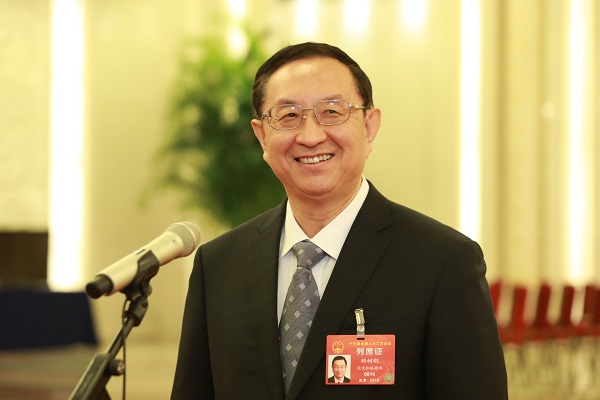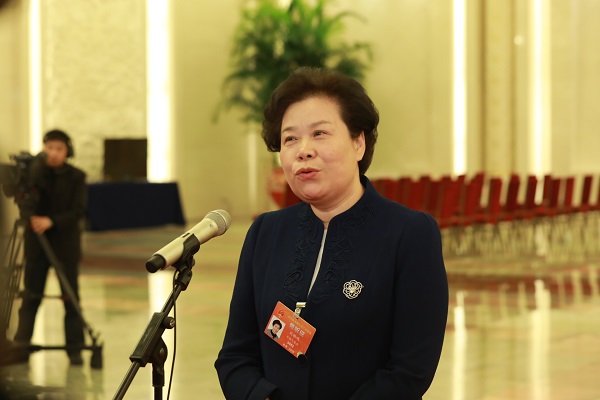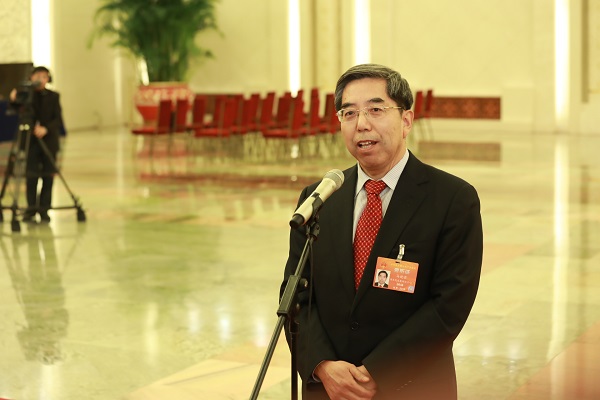Editor's note: Ministers took questions from reporters on issues of major public interest during interviews on the sidelines of the two sessions.
These are dubbed “passage interviews” because they usually take place on walkways leading to the main hall of the Great Hall of the People before or after plenary meetings of the National People's Congress and the National Committee of the Chinese People's Political Consultative Conference.
Here are the highlights of “passage interviews” on Friday afternoon:
Shift to high-quality tourism
“Last year, with 148 million outbound trips, China became the world's largest source of tourists. We will take measures to ensure the safety of outbound tourists, and guide the civilized behavior of outbound tourists,” said Luo Shugang, the minster of culture and tourism.

Luo Shugang, minster of culture and tourism (Photos: People's Daily app)
“China’s tourism sector is moving from quantity to quality,” Luo added. According to figures from the Ministry of Culture and Tourism, China's inbound tourism remained steady in 2018 and a total of 141 million inbound visitors were recorded. Inbound tourists brought a total of $127.1 billion in revenue to the tourism sector.
Domestic residents’ cultural and tourism consumption habits have evolved to become a new economic growth area in China. “Quality is the lifeblood of culture and tourism. We will launch more high-quality tourism products to better meet the growing needs of the people for cultural tourism. At the same time, more high-quality cultural resources will be transformed into high-quality tourism resources, and specialty tourism products will be elaborately created for people to enjoy,” Luo said.
Meteorological technology services in BRI countries
“We will improve our global meteorological services and provide meteorological services to countries along the Belt and Road Initiative (BRI), including important ports and routes,” said Liu Yaming, director of the China Meteorological Administration.

Liu Yaming, director of the China Meteorological Administration
Liu said that China has established an emergency support mechanism to provide information to BRI countries when they are severely in need of help.
The Fengyun meteorological satellite has been developed for 50 years, and 16 Fengyun satellites have been successfully launched. Currently, 8 of them are operating in orbit, monitoring meteorological information in China and around the globe in real-time.
“We use big data and new technologies to provide the public with intelligent, targeted weather services at any time, anywhere in the world,” said Liu.
Economic challenges spur China to upgrade further
China’s economy is experiencing a lower development rate as the world maintains a sluggish recovery and protectionism intensifies, said Ma Jiantang, secretary of the Development Research Center of the State Council.

Ma Jiantang, secretary of the Development Research Center of the State Council
The challenges also serve as opportunities for China, given its potentially huge and booming domestic market, said Ma. Slow economic performance will promote reform and opening up, injecting more energy into market. The trade protectionism can quicken the pace of China’s technological upgrading.
In a new round of high-tech revolution that has produced fruitful outcomes for customers worldwide, China is speeding up commercialization and industrialization of scientific research to push forward the economic development engine.
(Compiled by Bai Yuanqi, Wang Xiangyu and Zhang Jian)


